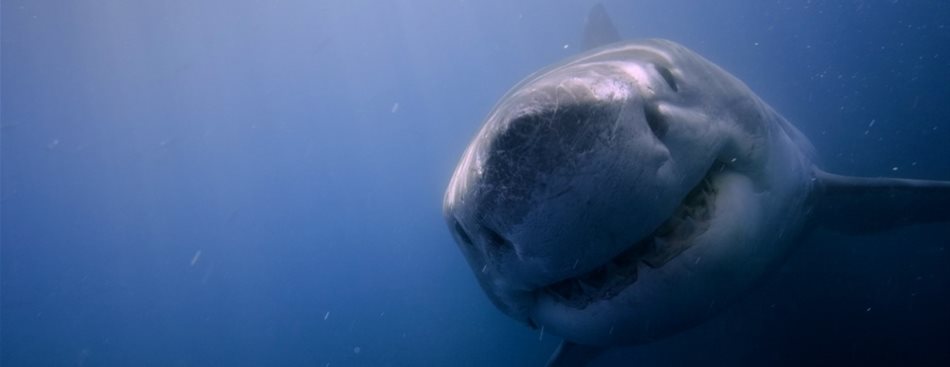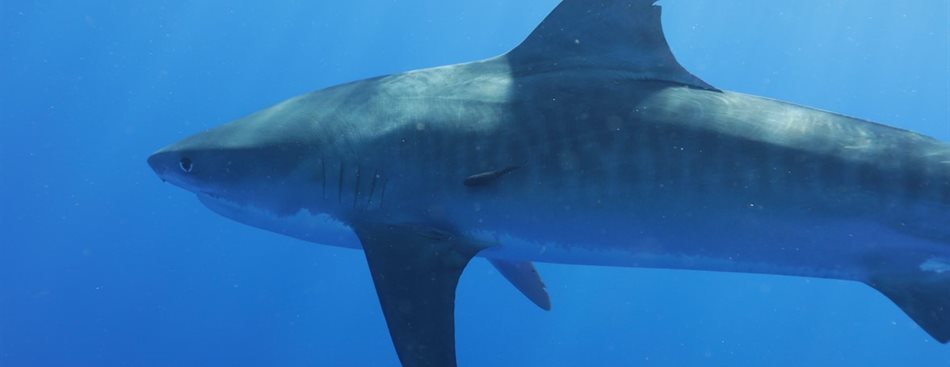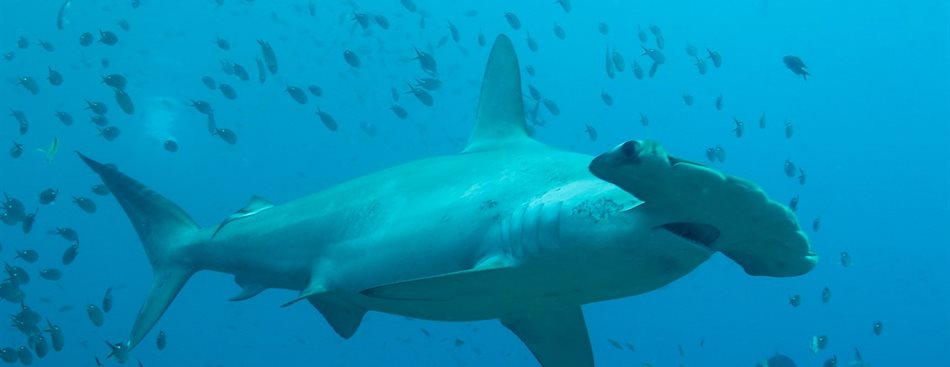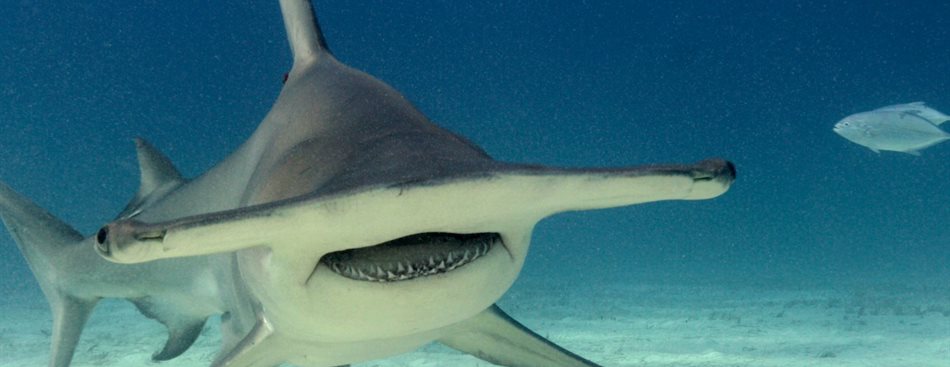
Counting Jaws
This year, Sharkfest makes a splash to celebrate a decade of the toothiest and truthiest shark content with the most immersive and massive programming experience to date. The only shark event that proves truth is stranger than fiction will take viewers up close and personal with one of nature’s most feared predators, swimming across National Geographic Wild (DStv 182, StarSat 221) every Saturday and Sunday from 18:00 (CAT) this July, and for the first time, viewers can feast on even more much-loved shark series and specials on Disney+.
Viewers can sink their teeth into almost 30 hours of original programming and over 60 hours of enhanced content featuring captivating science and stunning visuals of the iconic apex predator. Sharkfest not only shines a light on the science of sharks, giving audiences a better understanding of the ocean’s most misunderstood predator but also showcases their true beauty, power and mystery.
This year’s lineup offers a treasure trove of new original content that dives into details on over 15 different shark species and features footage from all over the world, including South Africa, the Galapagos Islands, Costa Rica, Australia, Hawaii, the Maldives, California, Massachusetts, Maine, Florida and more.
Sharkfest is the must-sea shark event of the year and sheds light on one of the most fascinating creatures on the planet. What makes this year’s fin-tastic lineup so special and unlike any other is the devotion to factual science paired with the stunning visuals captured by some of the best ocean videographers in the business.
Disney+ viewers can enjoy hours of specially curated shark content from National Geographic on the platform, which includes Great Shark Chow Down, Secrets of the Bull Shark, What the Shark?, Sharkatraz, Journey to Shark Eden, Sharkcano, Sharks of the Bermuda Triangle and more.
National Geographic has also partnered with Minorities in Shark Sciences (MISS) to encourage diversity and inclusion in the shark sciences field and inspire the next generation of scientists. This collaboration lends MISS experts – such as Candace Fields, a Ph.D. student studying the population dynamics and geographic population structure of large predators; Carlee Jackson, marine biologist, sea turtle conservationist and shark expert; and Jasmin Graham, who specialises in elasmobranch ecology and evolution – as on-screen talent for this year’s Sharkfest, as well as consultants for programming and development of shows.
The scientists and sharks have always been and continue to be the stars of Sharkfest.
Our featured shark experts this year include the following:
- Gibbs Kuguru, a Kenyan shark scientist who works with great whites and studies the DNA of sharks
- Candace Fields, a Ph.D. student studying the population dynamics and geographic population structure of large predators
- Carlee Jackson, a marine biologist, sea turtle conservationist and shark expert who is championing diversity in the world of science
- Jasmin Graham specialises in elasmobranch ecology and evolution. She is the project coordinator for the MarSci-LACE project, which is focused on researching and promoting best practices to recruit, support and retain minority students in marine science
- Alison Towner is a senior white shark biologist and Ph.D. student examining driving factors of movement in white sharks
- Dr Mike Heithaus, the executive dean of the College of Arts, Sciences & Education (Case) and professor in the department of biological sciences at Florida International University (FIU)
- Sara Casareto, a graduate student at Florida International University, working on her doctorate focusing on shark biology and behaviour
- Melissa Cristina Marquez, a Puerto Rican marine biologist and science communicator studying chondrichthyan fishes, such as great white sharks
- Ryan Johnson, a marine biologist and world-famous documentary host.

Gibbs Kuguru – Camo Sharks
“Camo Sharks is an investigation on what shark skin does and how their melanin behaves. It’s two scientists crafting lofty ideas, making failures, and trying again. Many of the experiments you will see are done for the first time by us, so we had no idea how this was going to turn out, but that’s what makes it so riveting!” said Gibbs Kuguru. “Camo Sharks is just one of the many specials included in this year’s Sharkfest, all of which share fascinating insights about these remarkable creatures and why they need our protection,” he added.
This year’s Sharkfest will make waves with something for everyone, from shark novices to shark enthusiasts. Highlights from this year’s Sharkfest lineup include:
Croc that Ate Jaws Enhanced
Saturday 2 July at 5.15pm
Around the world, crocs and gators are moving out to sea and deep into shark territory. With reports of clashes on the rise, scientists are sending cameras to investigate what happens when two of the deadliest predators on the planet match bites! Biologist and host Mike Heithaus investigates whether these predators are facing off more often than we realise, and who comes out on top when they do.
Jaws vs Boats
Saturday 2 July at 6pm
All across YouTube, viral videos abound of great whites and other sharks attacking boats with a ferocity and anger that has never been seen before. The question is, why? Is this simply a case of more people having cameras to video the behaviour, or is something else happening? Dr Mike Heithaus and Ph.D. candidate Sara Casareto set out to investigate what’s causing this clash between sharks and boats.
Baby Sharks
Saturday 2 July at 6.45pm
Even the biggest, fastest and fiercest predators start as babies. Baby sharks are cute, but they need to grow up fast because out of more than 500 species of sharks, not one parent sticks around to help raise them. Sharks are found in every ocean across the planet and have evolved in extraordinarily different ways to carry their young and give birth and for baby sharks to thrive.
Camo Sharks
Sunday 3 July at 6pm, repeats on 3 July at 8.20pm and 4 July at 9.35am
Can sharks change colour at will to enhance their predatory abilities? Through groundbreaking experiments, revered shark biologists answer this evolutionary question. Shark scientists Dr Ryan Johnson and Ph.D. candidate Gibbs Kuguru hope to capture real-time pigmentation changes to understand how these apex ocean predators manipulate their skin’s dermal cells to activate camouflage.
Counting Jaws
Sunday 3 July at 6.45pm
Shark encounters off the coast of California are skyrocketing. Now, a team of researchers is on a mission to investigate a newly discovered white shark hot spot close to popular beaches and determine how many great whites are out there. Their expedition will bring them face-to-face with some of the biggest sharks on the planet.
Jaws Invasion
Saturday 9 July at 6pm, repeat at 8.20pm
Big and dangerous predators are invading unexpected waters, from golf courses and swimming pools to lakes and backyard keys. Through analysing user-generated footage, shark experts get to the bottom of how and why sharks seem more willing than ever to meet us on our own turf. In a bizarre twist, people encountering sharks in unexpected places are called to urgent action.

Maui Shark Mystery
Maui Shark Mystery
Saturday 9 July at 6.45pm
Every year tiger sharks gather in big numbers in Maui. What’s the cause? It’s a mystery that’s a decade in the making. Now, a team of fearless shark scientists gets hands-on with one of the ocean’s largest predators to find out. That means free diving, face-to-face and unprotected. But these young women will do whatever it takes to get the data they need to crack the case.

Shark Side of the Moon
Shark Side of the Moon
Sunday 10 July at 6pm
The moon has an impact on animal species around the globe, but there’s never been a connection drawn between the lunar cycle and sharks. One scientist thinks the moon plays an important role in the migration and life cycle of the scalloped hammerhead, and he’s on a mission to see if his hypothesis is true. If there’s a tie between the hammerhead shark and the moon, there could be a tie with other shark species as well ... with a profound impact on both shark science and conservation.
Shark Queens
Sunday 10 July at 6.45pm
In the animal kingdom, males are often presumed to be the most dominant. But in the ocean, does this presumption hold water? Scientists search for answers to understand if the biggest and baddest sharks of them all are female. From the great white sharks of South Africa to the tiger sharks in the Maldives, the team seeks to uncover the ultimate rulers of the waves.
Sharks that Eat Everything
Saturday 16 July at 6pm
Dive into the jaw-dropping stories of anyone and anything that’s found themselves prey to the deadliest, toothiest terrors of the sea. The boundless hunger and curiosity of sharks can lead them to chow down on the most unexpected things, such as big game like hippos and crocs or inanimate objects like kayaks, cages and chicken coops.

World's Biggest Hammerhead?
World's Biggest Hammerhead?
Saturday 16 July at 6.45pm
Numerous reports of giant great hammerhead sharks, up to twenty feet in length, have put the actual size potential of this species into question. A team of scientists from Florida International University is now on an expedition off the Florida coast to try and find the world’s biggest hammerhead, taking them from the numerous bridges of the Florida Keys to the sharky waters of the Bahamas.
Sky Sharks
Sunday 17 July at 6pm
If you go down to the beach today, you could get a big surprise! Drones are revolutionising everything that we thought we knew about sharks. And the biggest surprise? That many sharks live closer to our shores than we might like to imagine. It’s time to look behind you; the ocean’s top predator could be much closer than you think!

Shark Superpower
Shark Superpower
Sunday 17 July at 6.45pm
Two teams of experts go to extraordinary lengths to take shark science into the wild as they investigate two of the most iconic shark superpowers: speed and bite force. In California, the race is on as Andy Casagrande attempts to reveal the top speed of the world’s fastest shark. And in the Bahamas, Brocq Maxey gets much closer than most to investigate the power in a shark’s bite.
Game of Sharks
Saturday 17 July at 7.30pm
It’s time for sharks to face off in the ultimate species competition with the greatest matchups the ocean has ever seen. In ten nail-biting competitions, we’ll prove once and for all which shark is the MVP of the open sea. The great white is favoured, but can it beat the shortfin mako in the 100-meter dash? Or out-jump the thresher shark? Can it keep up with the appetite of the whale shark? An underdog might just swim into first place!
Great White vs Tiger Shark
Saturday 23 July at 7.35pm
The two biggest of the big three – great whites and tiger sharks – are two of the most dangerous predators in the ocean. And they get big, up to 20 feet and 18 feet, respectively. But can they grow even larger than that? Where can we find the world’s biggest? Two teams of scientists are diving in to uncover the secrets of these powerful and majestic creatures.
Backyard Bull Sharks
Sunday 24 July at 7.30pm
Bull sharks are invading in a big way. Their bullish behaviour in oceans worldwide has made them famous from coast to coast. The seven seas aren’t enough; they’re taking over brackish waters and rivers too! Warmer waters due to climate change mean bull sharks can expand their range even further … so the more we learn about them now, the better.
Sharks vs the World
Sunday 31 July at 5.15pm
Ever feel like the world is working against you? Try being a shark! These predators of the deep have some serious beef with just about everyone. Whales, tuna, surfers, swimmers, they’re at odds with them all. In face-off after face-off, sharks prove they are the ultimate survivors.
When Sharks Attack (six-episode series)
Shark attacks seem to be on the rise in North America and beyond! But what’s causing the alarming uptick in human and shark encounters? Scientists investigate first-hand accounts, uncovering clues and details that will unravel the mystery behind the terrifying shark attack spike. The answers will impact beachgoers around the globe.
- Part 1 (Carnage in California) – Saturday 2 July at 7.30pm (repeat Saturday 9 July at 5.15pm)
Los Angeles is home to beautiful beaches and Hollywood blockbusters, but in the Summer of 2007, a dark story emerged from the depths. Four shark attacks occurred in just four months off the coast of Malibu. With the cause of the spike a mystery, scientists investigate the case and what they discover could impact beachgoers around the world.
- Part 2 (Hawaiian Night Fright) – Sunday 3 July at 7.30pm
The Hawaiian Islands are known as a place of beauty and tranquility. But in 2019, a rare shark emerged from the depths, attacking three swimmers in under five months. With only one other recorded attack from this rare shark species in Hawaii’s history, experts consider all clues to find the cause of the brutal attacks. Can they find the answer before this terror awakens again from the deep?
- Part 3 (Space Coast Scare) - Saturday 9 July at 7.35pm
In 2003 along Florida’s Space Coast, the power of rockets above are rivalled by the terror of the depths down below. Locals and visitors alike are shocked by ten shark attacks in just eight months, more shark attacks than in the entire previous decade. Investigators race to find answers and the cause will shock beachgoers around the globe.
- Part 4 (Twice Bitten) - Sunday 10 July at 7.35pm
- Part 5 (Gulf Fear) - Saturday 16 July at 7.35pm
- Part 6 (Paradise in Peril) - Sunday 17 July at 7.35pm
Shark Attack Files (eight-episode series)
- Part 1 (Food Fight) Saturday 23 July at 6pm
- Part 2 (Stealth Hunters) Saturday 23 July at 6.45pm
- Part 3 (Taste for Men) Sunday 24 July at 6pm
- Part 4 (City Bites) Sunday 24 July at 6.45pm
- Part 5 (Growing Pains) Saturday 30 July at 6pm
- Part 6 (Get Smart) Saturday 30 July at 6.45pm
- Part 7 (Unusual Suspects) Sunday 31 July at 6pm
- Part 8 (Wrecked) Sunday 31 July at 6.45pm
Scientists use cutting-edge technology to investigate startling new theories about the world’s most dramatic shark attacks. Why are sharks drawn to shipwrecks? Are sharks entering urban environments? Are pregnant sharks more likely to kill? Can humans outsmart sharks? Why do sharks prefer to attack men? New footage, survivor accounts and hands-on testing drive us toward stunning conclusions.
Dates are subject to change.